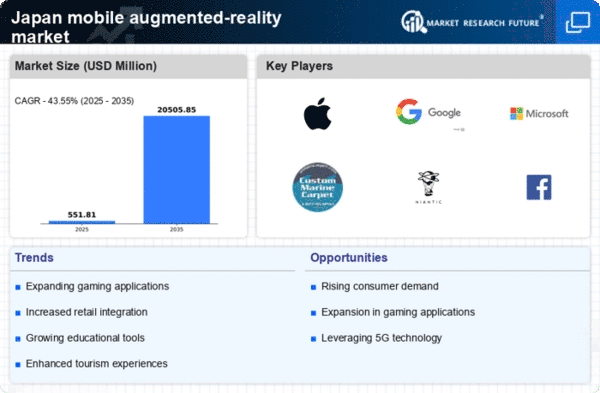Government Initiatives and Support
The Japanese government is actively promoting the adoption of advanced technologies, including augmented reality, which is positively influencing the mobile augmented-reality market. Various initiatives aimed at fostering innovation and digital transformation are being implemented, with a focus on enhancing the competitiveness of Japanese businesses. For instance, the government has allocated approximately ¥100 billion to support research and development in emerging technologies, including mobile augmented reality. This financial backing is expected to stimulate growth in the mobile augmented-reality market by encouraging startups and established companies to develop innovative applications. Furthermore, collaborations between government agencies and private enterprises are likely to facilitate the integration of augmented-reality solutions across different sectors, thereby broadening the market's scope.
Expansion of E-commerce and Online Shopping
The expansion of e-commerce and online shopping in Japan is significantly impacting the mobile augmented-reality market. As more consumers turn to online platforms for their shopping needs, retailers are increasingly adopting augmented-reality technologies to enhance the online shopping experience. Approximately 60% of Japanese consumers express interest in using augmented-reality features to visualize products before making a purchase. This trend is prompting e-commerce platforms to integrate augmented-reality functionalities, such as virtual try-ons and interactive product displays. Consequently, the mobile augmented-reality market is likely to benefit from this shift, as retailers seek to differentiate themselves in a competitive landscape. The combination of convenience and enhanced shopping experiences is expected to drive further growth in the mobile augmented-reality market.
Technological Advancements in Mobile Devices
The mobile augmented-reality market in Japan is experiencing a surge due to rapid technological advancements in mobile devices. The integration of high-performance processors, enhanced graphics capabilities, and improved sensors in smartphones has made it feasible to run sophisticated augmented-reality applications. As of 2025, approximately 75% of smartphone users in Japan own devices that support augmented-reality functionalities. This trend is likely to drive the demand for mobile augmented-reality applications across various sectors, including retail, entertainment, and education. Furthermore, the continuous evolution of 5G technology is expected to enhance the user experience by providing faster data transmission and lower latency, thereby facilitating more immersive augmented-reality experiences. Consequently, these technological improvements are pivotal in shaping the mobile augmented-reality market in Japan.
Increased Investment in Augmented-Reality Startups
Investment in augmented-reality startups in Japan is witnessing a notable increase, which is contributing to the growth of the mobile augmented-reality market. Venture capital firms and private investors are increasingly recognizing the potential of augmented reality as a transformative technology. In 2025, investments in augmented-reality startups in Japan are projected to reach approximately ¥30 billion, reflecting a growing confidence in the market's future. This influx of capital is enabling startups to innovate and develop cutting-edge mobile augmented-reality applications that cater to various industries, including healthcare, tourism, and education. As these startups emerge and expand, they are likely to enhance the overall ecosystem of the mobile augmented-reality market, driving further adoption and integration of augmented-reality technologies.
Rising Consumer Demand for Interactive Experiences
Consumer preferences in Japan are shifting towards more interactive and engaging experiences, which is propelling the mobile augmented-reality market. As individuals increasingly seek personalized and immersive content, businesses are compelled to adopt augmented-reality solutions to meet these expectations. Recent surveys indicate that around 68% of Japanese consumers express a preference for brands that offer augmented-reality experiences, particularly in retail and entertainment. This growing demand is prompting companies to invest in mobile augmented-reality applications that enhance customer engagement and satisfaction. Additionally, the rise of social media platforms that incorporate augmented-reality features is further driving consumer interest. As a result, the mobile augmented-reality market is likely to expand significantly in response to these evolving consumer preferences.
















